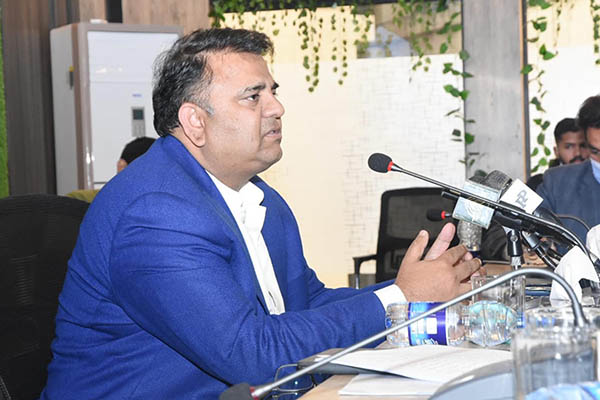
Photo courtesy PID
Information minister says government also working on enacting legislation to address use of ‘derogatory language’ on some TV channels, social media
The Pakistan Tehreek-e-Insaf (PTI)-led government has decided to establish a separate judicial system for overseas Pakistanis, Information Minister Chaudhry Fawad Hussain announced on Tuesday, in seeming contradiction of Prime Minister Imran Khan’s claims of desiring an end to “separate rules” for citizens depending on their resources.
“We [cabinet] have given approval for a separate judicial system for overseas Pakistanis, continuing our tradition to think about and work for their benefit,” Fawad told a post-cabinet meeting press briefing, adding that the new system would enable summary trials for cases involving overseas Pakistanis, which PTI lawmakers have repeatedly claimed would “ensure” their victory in the next general elections.
The minister said that legislation for the implementation of this system in Islamabad had been sent to the Council of Common Interests, adding that it would subsequently be adopted in other areas led by the PTI—Punjab, Khyber Pakhtunkhwa, Gilgit-Baltistan, Pakistan-administered Kashmir.
Admitting that expeditious trials were the right of every citizen, Fawad claimed that overseas Pakistanis deserved special consideration as they “can’t stay here [in Pakistan] for long” and cannot contest lengthy cases.
The information minister reiterated calls for judicial reforms, regretting that a “large number” of stay orders were preventing the Federal Board of Revenue from collecting billions of rupees in taxes. Claiming that the existing “stay order” policy was provoking an “administrative crisis,” he said the law ministry had been directed to directly address this issue with the chief justice of Pakistan and the chief justices of high courts. “It has been recommended that there should be a separate forum to resolve such policy issues and the cabinet hopes that the chief justice of Pakistan will present a serious point of view of the judiciary over this matter,” he said, claiming this was not a “political” decision, but rather a means to address an “administrative need.”
Fawad said the cabinet had also taken notice of the use of “derogatory language” on social media and some television channels, adding that a decision had been taken to frame laws to halt this. Without offering any specifics, he claimed such commentary and “propaganda campaigns” endangered “Pakistan’s national security.” As these are bailable offenses, he claimed, “appropriate” action could not be taken the culprits and the law ministry had been asked to improve the laws to ensure strict penalties.
EVMs
Referring to the polling in the first phase of local government elections in Khyber Pakhtunkhwa, which concluded last week with the opposition Jamiat Ulema-e-Islam (Fazl) securing 24 slots of mayor/chairperson of tehsil councils followed by PTI with 17, he claimed that the results had “proven” the need for electronic voting machines (EVMs).
Claiming that the number of rejected votes in several constituencies was more than the “margin between the votes of winners and losers,” he said “no votes” would be rejected with EVMs. “We have urged the Election Commission before and we ask them again to issue a tender for procuring EVMs … We don’t understand why the election commission is not making progress on this front,” he said. Last month, the Science and Technology Ministry had informed the ECP that it would be unable to produce sufficient EVMs for pilot testing of the technology in local body polls.
Vaccinations
The information minister said the Government of Pakistan had, thus far, administered COVID-19 vaccine doses worth over $2.5 billion as part of its ongoing vaccination campaign. Deriding the Pakistan Peoples Party government of Sindh province, he said Chief Minister Murad Ali Shah had claimed his provincial government would independently procure vaccines to inoculate citizens against the coronavirus but had failed to do so.
“The Sindh government has not spent even a single dollar on procuring the vaccines and it is the federal government that has been providing the province vaccines,” he said, claiming that the high positivity ratio of Karachi was due to the city’s low vaccination rate. He said overall, $725 million had been received from international institutions for the purchase of vaccines.
Other decisions
Fawad said the cabinet had approved a 15 percent increase in the salaries of civil armed forces, as announced by Prime Minister Imran Khan during a visit to Balochistan last week, as well as 15 percent disparity reduction allowance for federal government employees of grade one to 19.
The cabinet, he said, had also approved the country’s first ever digital cloud policy; the export of 34,500 metric tons of pulses to Afghanistan under the World Food Program; and the reduction in the price of Remdesivir injection for treatment of COVID-19 patients from Rs. 3,967 to Rs. 2,308. He said the cabinet had been informed that repayment of loans worth $821.80 million to Saudi Arabia had been deferred, adding the repayment of $4 billion to various creditor countries had also been deferred to 2027.
